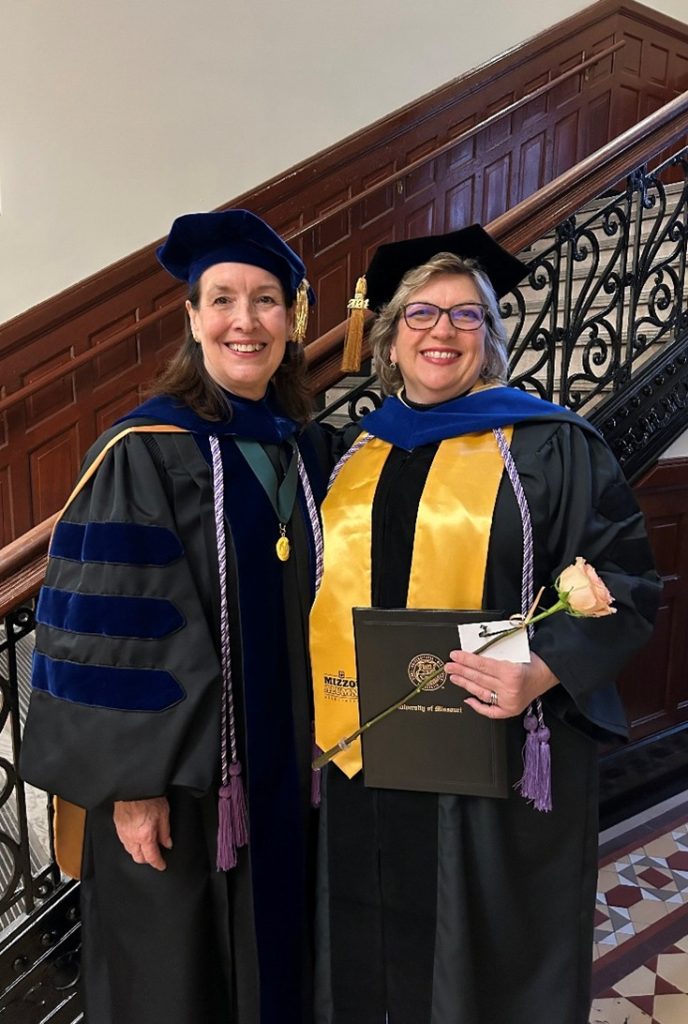
Our Doctor of Philosophy in Nursing (PhD) program prepares researchers, clinical scholars and educators for leadership roles across a wide spectrum of settings – including academia, healthcare systems, public health organizations, industry, government and other sectors – where advanced nursing and health care expertise is essential. Because the knowledge and skills needed to produce excellent health-related research is not discipline specific; the PhD program does not require a prior degree in nursing. Indeed, we have had PhD students with academic preparation in health administration, health education, health-related informatics, medical ethics, nursing, occupational therapy, physical therapy, public health and social work.
Pictured above: Dean Lori Popejoy and her PhD mentee, Daphne Chakurian PhD’24 at graduation. Daphne received the 2025 Dissertation Award from the Midwest Nursing Research Society, Gerontologic Nursing Science RIIG.
Program Overview
Our PhD program is highly individualized and flexible with the goal of accommodating the wide variety of learning needs of our students. To that end, we have an online option for distance learners and an international residential option for international students. We welcome both nurses and non-nurses with a degree in a health-related field into our PhD program and have plans of study to accommodate both post-baccalaureate, post-masters and post-clinical doctorate students.
Once selected for admission, you are paired with a PhD advisor with whom you have a good research match in terms of research methodology, population of interest and/or phenomenon of interest. Your advisor provides guidance on establishing your PhD program committee. Your PhD program committee guides your Plan of Study, research practicum experiences and, ultimately, your dissertation research. All new PhD students are required to start during the summer semester and attend June On Campus Intensive Orientation (3 days) on the University of Missouri campus in Columbia, Missouri.
The required coursework in the PhD curriculum includes several core areas. The core curriculum is completed in sequence and provides a strong foundation upon which to examine your research interest area.
- Philosophical, theoretical and scientific basis
- Optimizing community and population health care
- Statistics
- Emerging areas of science and technology
- Research design, ethics and methods
- Professional identity and role
In collaboration with your PhD program committee, you will select individualized specialty coursework and practicum experiences to support your research interests and professional goals. Regardless of the program option, all PhD students are expected to attend the 4-day April On Campus Intensive each year they are enrolled in coursework. With guidance from your PhD committee, you will develop competencies in presenting, collaborating and writing manuscripts and grant proposals—gaining transferable skills for leadership and career success across disciplines.
Once the coursework is completed, you will prepare for your doctoral comprehensive examination, develop your research proposal and begin your dissertation research project. The doctoral dissertation and its defense are the program’s culmination and demonstrate your ability to identify and pursue research that meets the highest professional standards.
PhD Student Program Outcomes (For all PhD students admitted June 2024 or earlier)
While maintaining a foundational commitment to building nurse scientists, faculty collaborations within and outside the Sinclair School of Nursing provide a rich environment for both nurses and non-nurses to flourish and develop their scholarship. Regardless of academic background, all PhD students are mentored to achieve the following program outcomes:
1. Assume leadership roles in nursing and health care.
2. Initiate and maintain collaborative relationships with nurses and individuals in other disciplines.
3. Advance nursing and health care knowledge by critically evaluating existing theories and knowledge and identifying new areas of inquiry for research
4. Develop the science that guides nursing practice and/or health care by conducting original research using established ethical principles and disseminating research findings to advance new directions in theory, practice and education.
5. Educate the next generation through formal teaching and mentoring.
6. Advance development of health policy, through application of research and advocacy for ethical decision-making.
New PhD Student Program Outcomes (For all PhD students admitted June 2025 or later)
While maintaining a foundational commitment to building nurse scientists, faculty collaborations within and outside the Sinclair School of Nursing provide a rich environment for both nurses and non-nurses to flourish and develop their scholarship. Regardless of academic background, all PhD students are mentored to achieve the following program outcomes:
1. Demonstrate the potential for leadership roles in nursing, health systems and/or industry that positively impact quality, safety, practice and/or policy.
2. Exemplify scholarly productivity.
3. Collaborate across settings and disciplines to address social determinants of health and advance population health outcomes.
4. Advance knowledge to promote health through innovative research encompassing the individual, interpersonal, community and societal domains.
5. Conduct theoretically driven, innovative and ethical research in emerging areas of science and technology.
6. Incorporate evidence-based teaching, learning and/or mentoring strategies.
Learn More
For more information about our PhD program, submit an inquiry request.